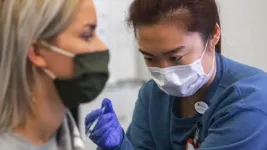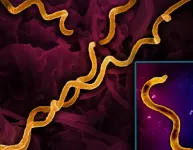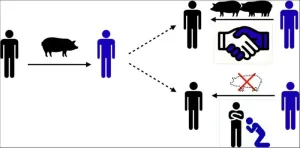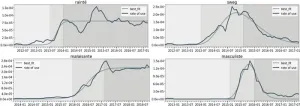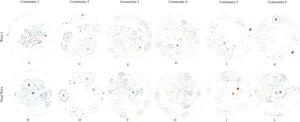Study: Late start of COVID treatment may still benefit immunocompromised patients
2024-09-03
(Press-News.org)
ATLANTA — Starting antiviral treatment as late as 14 days after infection with SARS-CoV-2 may still be beneficial in hosts with compromised immune systems, who are at greatest risk of developing severe COVID-19, according to researchers in the Center for Translational Antiviral Research at Georgia State University’s Institute for Biomedical Sciences.
While best to begin treatment earlier, in immunocompromised hosts, drugs like paxlovid and molnupiravir appear to inhibit replication of the virus even if initiated up to 14 days after infection.
The study, published in the Journal of Virology, offers new information about late-onset treatment introduced 14 days after infection with SARS-CoV-2, the virus that causes COVID-19. The findings demonstrate that antiviral therapeutics could have valuable clinical use in late-onset management of persistent SARS-CoV-2 infection in immunocompromised patients, in addition to reducing the risk of progression to severe disease.
The researchers sought to offer specific SARS-CoV-2 treatment plans to the immunocompromised and tested late-onset therapeutic options with standard-of-care paxlovid and molnupiravir and experimental therapeutic 4’-Fluorouridine (4’-FlU) in a T-cell depleted immunocompromised mouse model of SARS-CoV-2.
The Centers for Disease Control and Prevention (CDC) recommends that individuals with impaired immune functions use antivirals and immunomodulatory drugs at the doses and durations similar to the general patient population, but this new study indicates benefits of late treatments to mitigate persistent viral replication, the authors explained.
“Paxlovid, molnupiravir and pre-clinical candidate 4’-FlU significantly lowered virus loads in turbinates (bony structures in the nose that regulate airflow and warm and humidify air that is inhaled) when treatment was initiated 14 days after the infection for seven days,” said Dr. Carolin M. Lieber, first author of the paper and a postdoctoral fellow in the Center for Translational Antiviral Research at Georgia State.
“We demonstrated that late-onset antiviral treatment can provide major therapeutic benefit to an immunocompromised host infected with SARS-CoV-2,” said Dr. Richard K. Plemper, senior author of the study, Regents’ Professor and Director of the Center for Translational Antiviral Research at Georgia State. “This study highlights that appropriately powered clinical trials are urgently needed to best serve the specific needs of a patient population at high risk to develop severe COVID-19.”
In the study, immunocompromised mice experienced low-level viral replication for 35 days after the infection with SARS-CoV-2. When started on antivirals 14 days after infection, however, the duration of virus replication was significantly shortened, which could have implications for clinical usage of antiviral drugs in immunocompromised patients.
Additional authors of the study include Hae-Ji Kang, Vu Ngo and Andrew Gewirtz of the Institute for Biomedical Sciences at Georgia State; Elizabeth Sobolik and Alexander Greninger of the University of Washington Medical Center; Zachary Sticher, Alexander Kolykhalov and Michael Natchus from the Emory Institute for Drug Development; and Mehul Suthar from the Emory University School of Medicine.
The study was funded by public health service grants.
To read the study, visit https://journals.asm.org/doi/10.1128/jvi.00905-24.
END
[Attachments] See images for this press release:


ELSE PRESS RELEASES FROM THIS DATE:
2024-09-03
Assorted, distinctive behavior of molten uranium salt revealed by neutrons
The Department of Energy’s Oak Ridge National Laboratory is a world leader in molten salt reactor technology development — and its researchers additionally perform the fundamental science necessary to enable a future where nuclear energy becomes more efficient. In a recent paper published in the Journal of the American Chemical Society, researchers have documented for the first time the unique chemistry dynamics and structure of high-temperature liquid uranium trichloride ...
2024-09-03
The shoebox-sized BurstCube satellite has observed its first gamma-ray burst, the most powerful kind of explosion in the universe, according to a recent analysis of observations collected over the last several months.
“We’re excited to collect science data,” said Sean Semper, BurstCube’s lead engineer at NASA’s Goddard Space Flight Center in Greenbelt, Maryland. “It’s an important milestone for the team and for the many early career engineers and scientists that have been part of the mission.”
The ...
2024-09-03
Lugano, Switzerland, 3 September 2024 – The ESMO Congress 2024 will take place from September 13-17 in Barcelona, bringing together participants from all over the world. Press representatives eager to grasp cutting-edge data and hearing expert perspectives on the latest research, as well as on the current and emerging hot topics in oncology, are invited to attend the event, which will be held both onsite and remotely.
The full congress program is available online to help press representatives browse regular and late-breaking abstract ...
2024-09-03
We all have lived through a pandemic, its uncertainties, challenges, losses and scientific breakthroughs. A prestigious award from the U.S. National Science Foundation (NSF) is advancing the work of a team of researchers at the University of Kentucky to help society be better prepared for potential future pandemics.
Scott Berry, Ph.D., an associate professor in the Department of Mechanical and Aerospace Engineering in the UK Stanley and Karen Pigman College of Engineering, is the principal investigator ...
2024-09-03
The National Institutes of Health’s National Institute of Allergy and Infectious Diseases (NIAID) has awarded grants for 10 projects to improve diagnostic tools for congenital and adult syphilis—conditions currently diagnosed with a sequence of tests, each with limited precision. The Centers for Disease Control and Prevention (CDC) estimates that adult and congenital syphilis cases increased by 80% and 183% respectively between 2018 and 2022—a crisis that prompted the U.S. Department of Health and Human Services (HHS) to establish a national taskforce to respond to the epidemic.
“Syphilis ...
2024-09-03
New findings provide quantitative criteria for classifying social organizations in human history, together with potential explanatory variables that can be empirically measured for anthropology, history, and archaeology, according to a study published September 3, 2024 in the open-access journal PLOS Complex Systems by Kenji Itao and Kunihiko Kaneko from the University of Tokyo, Japan and Copenhagen University, Denmark (Kaneko) and the RIKEN Center for Brain Science, Japan (Itao).
Human societies have experienced transitions between different types of organizations, including bands, tribes, chiefdoms, and kingdoms. However, quantitative characterizations of the types and mechanisms of ...
2024-09-03
The more centrally connected someone is within their social media network, the more likely that new words they use will become adopted into mainstream language, according to a new study published this week in PLOS Complex Systems by Louise Tarrade of École Normale Supérieure, France, and colleagues.
Language evolves within a social context and variations in a language are always in competition with each other. In everyday language, words are constantly being created, but not all these words persist.
In the new study, researchers analyzed more than 650 million tweets written in French between 2012 and 2014 to identify ...
2024-09-03
In US community efforts to prevent childhood obesity, women leaders with more experience and connections have the greatest impact.
####
In your coverage, please use this URL to provide access to the freely available article in PLOS Complex Systems: https://journals.plos.org/complexsystems/article?id=10.1371/journal.pcsy.0000004
Article Title: Determinants and facilitators of community coalition diffusion of prevention efforts
Author Countries: United States
Funding: TM, MP, and CE received funding from the ...
2024-09-03
After four years, a guidebook for the future of autonomous trucking has driven across the finish line.
In 2020, the Virginia Tech Transportation Institute (VTTI) and 17 partners were awarded a $7.5 million grant from the U.S. Department of Transportation to develop a concept of operations. The final report, published in July, includes best practices for the implementation of automated driving systems (ADS) in large trucks and policy issues for fleets to consider across eight topic areas.
“We’re excited that the Federal Motor Carrier ...
2024-09-03
A patient dozes off in a dental chair despite the anxiety of an impending procedure. A seemingly unremarkable act but — for dentists versed in the latest sleep research — this red flag hints at a life-threatening condition.
In a research review published in the Journal of the American Dental Association, Rutgers Health researchers identified dentists as an unexpected player in the battle against life-threatening sleep disorders.
The review suggests dental professionals have unique opportunities to screen for conditions such as obstructive sleep apnea, a disorder that affects millions of Americans and is linked to serious health risks, including cardiovascular ...
LAST 30 PRESS RELEASES:
[Press-News.org] Study: Late start of COVID treatment may still benefit immunocompromised patients




